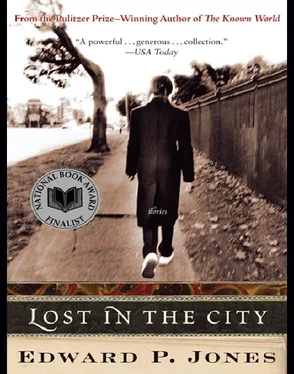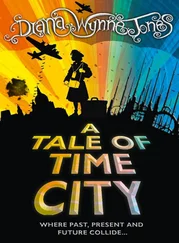Ralph was the first colored child anyone knew to have his own television. In his house there had been three bedrooms, but Thelma persuaded her husband that an asthmatic child needed more space. Her husband knocked down the walls between the two back bedrooms and Ralph then had a bedroom that was nearly twice as large as that of his parents. And in that enormous room, she put as much of the world as she and her husband could afford.
Aside from watching Thelma, what Betsy Ann enjoyed most in that house was the electric train set, which dominated the center of Ralph’s room. Over an area of more than four square feet, running on three levels, the trains moved through a marvelous and complete world Ralph’s father had constructed. In that world, there were no simple plastic figures waving beside the tracks. Rather, it was populated with such people as a hand-carved woman of wood, in a floppy hat and gardener’s outfit of real cloth, a woman who had nearly microscopic beads of sweat on her brow as she knelt down with concentration in her flower garden; several inches away, hand-carved schoolchildren romped about in the playground. One group of children was playing tag, and on one boy’s face was absolute surprise as he was being tagged by a girl whose cheek was lightly smudged with dirt. A foot or so away, in a small field, two hand-carved farmers of wood were arguing, one with his finger in the other’s face and the other with his fist heading toward the chest of the first. The world also included a goat-populated mountain with a tunnel large enough for the trains to go through, and a stream made of light blue glass. The stream covered several tiny fish of many colors which had almost invisible pins holding them suspended from the bottom up to give the impression that the fish were swimming.
What Thelma would not put in her son’s enormous room, despite years of pleadings from him, was a dog, for she had learned in childhood that all animals had the power to suck the life out of asthmatics. “What you need with some ole puppy?” she would tease sometimes when he asked. “You’ll be my little puppy dog forever and forever.” And then she would grab and hug him until he wiggled out of her arms.
By the time he was six, the boy had learned that he could sometimes stay all day in the room and have Thelma minister to him by pretending he could barely breathe. He hoped that over time he could get out of her a promise for a dog. But his pretending to be at death’s door only made her worry more, and by the middle of 1961, she had quit her part-time, GS-4 clerk-typist position at the Interior Department, because by then he was home two or three times a week.
Gradually, as more people moved out of Myrtle Street, the room became less attractive for Betsy Ann to visit, for Ralph grew difficult and would be mean and impatient with her and other visiting children. “You stupid, thas all! You just the stupidest person in the whole wide world,” he would say to anyone who did not do what he wanted as fast as he wanted. Some children cried when he lit into them, and others wanted to fight him.
In time, the boy Betsy Ann once bullied disappeared altogether, and so when she took him assignments from school, she tried to stay only the amount of time necessary to show politeness. Then, too, the girl sensed that Thelma, with her increasing coldness, felt her son’s problem was partly the result of visits from children who weren’t altogether clean and from a niece who lived her life in what Thelma called “pigeon air” and “pigeon dust.”
When he found out, the details of it did not matter to Robert Morgan: He only knew that his daughter had been somewhere doing bad while he was out doing the best he could. It didn’t matter that it was Darlene Greenley who got Betsy Ann to go far away to 7th and Massachusetts and steal candy bars from Peoples Drug, candy she didn’t even like, to go away the farthest she had ever been without her father or Miss Jenny or some other adult.
She knew Darlene, fast Darlene, from going to Ralph’s (“You watch and see,” Darlene would whisper to her, “I’m gonna make him my boyfriend”), but they had never gone off together before the Saturday that Thelma, for the last time, expelled all the children from her house. “Got any money?” Darlene said on the sidewalk after Thelma had thrown them out. She was stretching her bubble gum between her teeth and fingers and twirling the stuff the way she would a jump rope. When Betsy Ann shook her head, Darlene said she knew this Peoples that kinda like y’know gave children candy just for stopping by, and Betsy Ann believed her.
The assistant manager caught the girls before they were out of the candy and toy aisle and right away Darlene started to cry. “That didn’t work the last time I told you to stay outa here,” the woman said, taking the candy out of their dress pockets, “and it ain’t gonna work now.” Darlene handed her candy over, and Betsy Ann did the same. Darlene continued to cry. “Oh, just shut up, you little hussy, before I give you somethin to really cry about.”
The assistant manager handed the candy to a clerk and was about to drag the girls into a back room when Etta O’Connell came up the aisle. “Yo daddy know you this far from home, Betsy Ann?” Miss Etta said, tapping Betsy Ann in the chest with her walking stick. She was, at ninety-two, the oldest person on Myrtle Street. It surprised Betsy Ann that she even knew her name, because the old woman, as far as Betsy Ann could remember, had never once spoken a word to her.
“You know these criminals?” the assistant manager said.
“Knowed this one since the day she born,” Miss Etta said. The top of her stick had the head of an animal that no one had been able to identify, and the animal, perched a foot or so higher than Miss Etta’s head, looked down at Betsy Ann with a better-you-than-me look. The old woman uncurled the fingers of the assistant manager’s hand from around Betsy Ann’s arm. “Child, whatcha done in this lady’s sto?”
In the end, the assistant manager accepted Miss Etta’s word that Betsy Ann would never again step foot in the store, that her father would know what she had done the minute he got home. Outside, standing at the corner, Miss Etta raised her stick and pointed to K Street. “You don’t go straight home with no stoppin, I’ll know,” she said to Betsy Ann, and the girl sprinted off, never once looking back. Miss Etta and Darlene continued standing at the corner. “I think that old lady gave me the evil eye,” Darlene told Betsy Ann the next time they met. “She done took all my good luck away. Yall got ghosties and shit on yo street.” And thereafter, she avoided Betsy Ann.
Robert tanned her hide, as Miss Jenny called it, and then withheld her fifty-cents-a-week allowance for two months. For some three weeks he said very little to her, and when he did, it was almost always the same words: “You should be here, takin care a them damn birds! That’s where you should be, not out there robbin somebody’s grocery store!” She stopped correcting him about what kind of store it was after the first few times, because each time she did he would say, “Who the grownup here? You startin to sound like you runnin the show.”
The candy episode killed something between them, and more and more he began checking up on her. He would show up at the house when she thought he was out working. She would come out of the coop with a bag of feed or the broom in her hand and a bird sitting on her head and she would find him standing at the kitchen window watching her. And several times a day he would call Miss Jenny. “Yo daddy wanna know if you up there,” Miss Jenny would holler out her back window. Robert called the school so much that the principal herself wrote a letter telling him to stop.
Читать дальше












